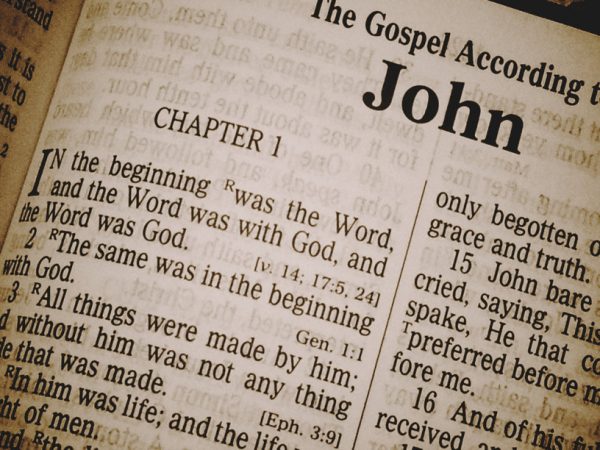For many years now, people have been debating whether or not there are contradictions in the bible. Given the unique popularity of the Holy Book, there are a great many takes on the matter, some meant to clarify mistakes, some riddled with inaccuracies and malintent.
Since religion is a subjective matter by definition, it is outstandingly difficult to remain objective when assessing this matter. This is why the vast majority of articles discussing biblical contradictions either reject this notion completely or depict the Bible as poorly written and even misleading document.
The truth remains somewhere between the lines and it remains to each of us to interpret the matter according to our beliefs, but most importantly, according to historical facts. We are going to point out some of the most famous Bible contradictions so that you can decide for yourself what the significance of these inconsistencies is for you.

Are There Contradictions in the Bible?
10. What came first, the light or the Sun?
This is one of the most discussed contradictions in the Bible, as it sets the tone for the entire document. The Book of Genesis tells us that God created the world from nothing. “The earth was a formless void and darkness covered the face of the deep”. Then God said “Let there be light” and there was light.
Up to this point, everything makes sense. Then God is said to have separated the light from the darkness and to have called the light day and the darkness night. But then the Bible says “And there was evening and there was morning, the first day”. This is the first aspect that is usually brought up for discussion, as the Sun is created quite a while later.
God is said to have created the sky, the waters of the Earth and the entire vegetation before having made the sun and the stars. According to the current notions of natural physics, the course of creation does not make sense, as the presence of the sun is necessary for the existence of light, morning, evening, day, waters, vegetation, and so on.

This is indeed one of the contradictions in the Bible, beyond any shadow of a doubt. However, the significance of this inaccuracy should be proportional to the causes that have led to it. Firstly, the Bible is a man-made document. It represents God’s actions and God’s word, as its human vessels have managed to put it onto paper.
This is probably the most relevant argument why inaccuracies in the Bible were inevitable. Secondly, the Bible has more than one writer, which also makes is extremely prone to contradictions, mistakes, and inconsistencies.
Thirdly, the Bible includes documents written up to 3500 ago (the books of Moses), which should also explain why some data inaccuracies were imminent. So the most important message conveyed by the book of Genesis should be that God created the world from nothingness, regardless of the sequence of events that led to the creation process.
9. Is God Universally Good or Is His Kindness Conditioned by Belief?
Psalm 145:9 says “The Lord is good to all: and his tender mercies are over all his works”. While this is probably one of the most important sections in the bible, it seems that it is later contradicted. JER 13:14 says “And I will dash them one against another, even the fathers and the sons together, said the Lord: I will not pity them, nor have mercy, but destroy them”.

The main explanation for such contradictions in the Bible is the fact that the only ones who are worthy of God’s love are those who truly believe in Him and his learning and who abide by the Christian ways. Those who are “wicked” only deserve to be punished, as they do not deserve to take comfort in God’s love.
8. To Be or Not to Be Wise? That Is Indeed the Question!
The Bible is filled with many different takes on the significance and the effects of wisdom on men. On one hand, PRO 4:7 says “Wisdom is the principal thing; therefore, get wisdom: and with all thy getting get understanding”. On the other hand, ECC 1:18 says that in wisdom lies grief and sorrow. Moreover, it is said that the more wisdom one acquires, the more sorrow this will bring about.
Matthew 5:3 writes that “Blessed are the poor in spirit, for theirs is the kingdom of Heaven”. Then, in 1CO 1:19, we are told that God will destroy the “wisdom of the wise” and bring their knowledge to nothing. Pairing these two sections would suggest that the Lord does not support expanding one’s horizons.
However, another interpretation would be that with great wisdom comes great responsibility, which is bound to bring about an internal struggle that is not for everybody to bear. On the other hand, those who do not seek wisdom are likely to remain in a state of protected bliss as they will never know the sorrow caused by the weight of knowledge.
7. Should Children Pay for the Sins of their Fathers?
Ezekiel 18:20 clearly states that sons shall not be held responsible for the wrongdoings of their fathers. On the other hand, Exodus 20:5 says: “I, the Lord, thy God, am a jealous God, visiting the iniquity of the fathers upon the children unto the third and fourth generation.”, which clearly points to contradictions in the Bible.

Whether or not sin is transferred onto future generations ultimately remains unclear. However, people are inevitably shaped by the actions and the history of their families. This would explain to a certain extent why somebody’s sins would affect descendants up to distant generations.
6. Is God’s Anger Forever?
This is one of the most popular contradictions in the Bible. Jeremiah 3:12 says that God is merciful and that He shall not keep anger forever. However, Jeremiah 17:4 reads “Ye have kindled a fire in mine anger, which shall burn forever”. Thus, the extent of God’s anger remains incoherently described.
However, the forgiveness of God is all that we can aim for as none of us is free of sin. Admitting and acknowledging our wrongdoings may be the only way to minimize the Lord’s wrath.
5. Are All Sins Forgivable?
John 1:9 says that God will forgive all of our sins and purify us, as long as we confess these and as long as our faith in Him is real. However, Mark 3:28-29 mentions a sin that is without forgiveness. “(…) whoever blasphemes against the Holy Spirit will never be forgiven”. This is deemed to be an “eternal sin”.
Hopefully, with enough faith in God’s mercy, all sins will be forgiven. Considering that there is enough mention about God’s unique ability to forgive those who have wronged Him, there is hope that no sin is eternal.
4. Does God Tempt Us?
JAS 1:13 says “God cannot be tempted with evil, neither tempteth he any man”. This is contradicted by GEN 22:1, which says that God tempted Abraham. This clearly brings about an inconsistency regarding the divine origins of temptation.
While popular belief makes the Devil responsible for tempting people into sinning, there is another widely spread notion that out faith will be tempted many timed during our lives and that it is up to us every time to resist it and remain pure.
The perfect way to clarify this is Matthew 6:13 which says “And lead us not into temptation, but deliver us from the evil one”. Whoever may be behind the temptation, it is our faith that will keep us free of sin.
3. Are We All Sinners?
There are a great many passages in the Bible that point out that it is inevitable that people sin, “for there is no man that sinneth not” (1KI 8:46, 2CH 6:36). Purity is the aim that all men must have, as this is something that only God Himself may achieve. As such, men are made to sin and thus learn the value of God’s forgiveness so that they can be forgiving with other men in their turn.

On the other hand, JO1 3:9 says “Whomever is born of God doth not commit sin; (…) he cannot sin, because he is born of God”. This is often regarded as one of the contradictions in the Bible, but it may have actually been meant to point out that the closer we get to God, the further we are from sin.
2. On Good Deeds
An inconsistency that is often regarded as one of the contradictions in the Bible is God’s take on good deeds. When we actually do something good, are we supposed to keep it secret or are we supposed to tell others about it so that they may be inspired by out deeds?
Matthew 5:16 says “let your light shine before men, that they may see your good deeds and praise your Father in Heaven”. Other passages, such as Matthew 6:3-4, say that people should keep their good deeds secret and that they will be rewarded by the Holy Father for them.
This brings about the discussion about man’s motivation to do good and whether or not man is capable of genuinely altruistic actions. The best way to explain the difference between these two passages is that as long as bringing our good deeds up for discussion and making them visible is capable of generating more good, as a reflection of God’s greatness, it is worth doing.
On the other hand, if the reason why we make our good deeds visible to others is personal recognition, the aim becomes impure and the value of the deed is significantly diminished.
1. On Judgment
Whether or not Christians should judge others remains widely debatable. While 1COR 2:15 says that “The spiritual man makes judgment about all things, but he himself is not subject to any man’s judgment.”, 1COR 4:5 says that people should not pass judgment upon others, as this is for God to do. The Lord is the only one who can make worthy judgment and then pass His praises onto those who deserve them.
This could be regarded as one of the contradictions in the Bible, but it could also be interpreted as an exercise of understanding, forgiveness, and above all, faith. A good Christian will analyze a situation and recognize the limitations of his brothers, as well as the tests that they must pass in order to demonstrate their faith and develop it even further.
Therefore, the judgment is made in relation to God’s intentions, rather than directly to the actions of others. It is not up to Christians to tell others what is just or not, for only God is capable of making such an assessment. Moreover, people should refrain from judging others by their own beliefs and most importantly, they should refrain from telling their brothers about it.

These are only some of the contradictions in the Bible. While there are many more of these throughout the entire document, it is crucial that each of us tries to understand how and why these have appeared. As we mentioned above, it is extremely important that people acknowledge that the Holy Book itself is not made by God, but by his vessels, who were human like each of us.
Moreover, the Holy Book is comprised of various documents written at different times and under very different circumstances. This makes Bible contradictions virtually inevitable. Instead of viewing these Bible inconsistencies as a reason to doubt the word of God, we could use them to help us reflect on the significance of His teachings.
The Bible should be regarded as a book of lessons, a code of Christian conduct, but it is imperative that people understand that as a document, it is limited. While the word of God is divine, the Great Book is a historical document meant to pass on the proper Christian ways. Many of the Biblical contradictions may have sprung from imperfect writing, inaccurate translations, and a different understanding of the divine facts.
Ultimately, being a good person and a true reflection of God’s greatness relies on what we decide for ourselves every day. And in spite of the sporadic contradictions in the Bible, the Great Book relays clear guidance to what it means to be a good Christian. Whether we choose to put these teaching into practice is up to each of us, for we are the only ones who can deice our fates.
Image Sources: wikimedia, staticflickr,